A
Auto Express
Guest
Verdict
Vauxhall was being ambitious launching a full-sized four-seater convertible pitched squarely against more premium models. While those rivals were significantly more costly, style-conscious buyers were always going to be put off by the Vauxhall badge.
That’s a shame, because there’s a lot to like about the Cascada, which is comfortable and relaxing to drive (although enthusiasts will be disappointed), plus there’s room for the whole family. Scuttle shake is barely noticeable and refinement is good, but even in range-topping Elite form the quality of the cabin is a little disappointing, while the 1.4-litre petrol engine could do with a bit more grunt. But when you look at what you get for your money, it’s easy to make a case for the Vauxhall, which, as always with the brand, plays the value card very heavily.
Models covered: Vauxhall Cascada Mk1 (2013-2018) - Vauxhall's four-seater convertible is a rare sight on British roads, despite having many alluring qualities.
History
The Cascada reached Vauxhall showrooms in April 2013, priced from £23,995 for the entry-level turbocharged 1.4 SE. There were two trim levels (SE and Elite), and alongside the manual-only 1.4-litre turbo engine was a 1.6-litre turbo-petrol (dubbed SIDI), which came only with an automatic transmission.
At first there was just one diesel engine: a 2.0 CDTi unit rated at 168bhp that was offered with manual or automatic gearboxes. A twin-turbo 197bhp 2.0 CDTi engine was added to the range soon after the Cascada’s launch. While the other engines could be had with either trim, this came only in Elite form.
Another new engine joined the line-up in January 2014: a 197bhp version of the turbocharged 1.6-litre petrol engine, which was only available with a manual gearbox.
Which one?
We wouldn’t steer you away from any Cascada derivative, but the automatic transmission isn’t all that slick, so our preference is for a manual. The 1.6-litre petrol unit is noticeably perkier than the 1.4-litre alternative, which can struggle if the car is loaded up, although the smaller engine is much more common.
The SE is well equipped with 18-inch alloys, rear parking sensors, sports front seats, air-conditioning, cruise control, DAB radio and remote roof operation. The Elite adds dual-zone climate control, perforated leather trim, a heated flat-bottomed steering wheel, automatic lights and wipers, electric seatbelt presenters, plus electric adjustment and heating for the front seats.
Alternatives
To a point the Cascada is in a class of its own, because while there are other four-seat convertibles, they’re invariably more expensive or less spacious. For example, the Audi A3 and Volkswagen Golf cabriolets are stylish, very well made and come with some excellent engines, but they don’t offer the Cascada’s cabin space. The BMW 3 Series (later 4 Series) comes with some superb engines, a well made cabin, and it’s great to drive, but you’ll pay a lot more than you would for an equivalent Cascada.
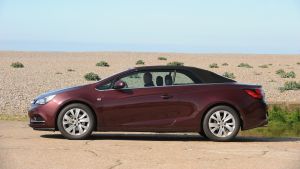
image
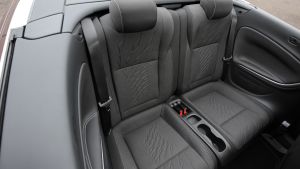
image
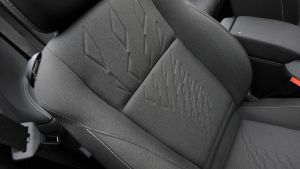
image
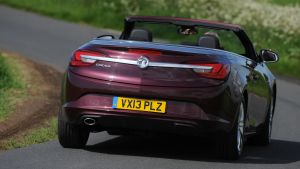
image
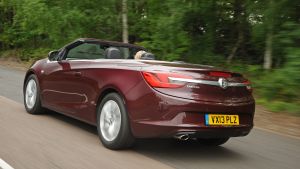
image
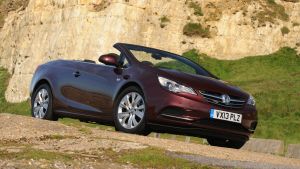
image
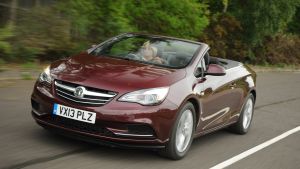
image
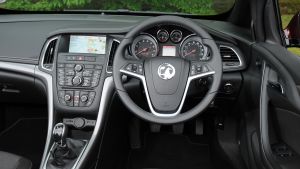
image
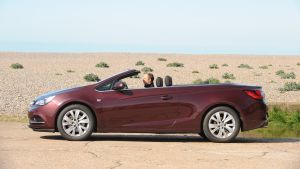
image
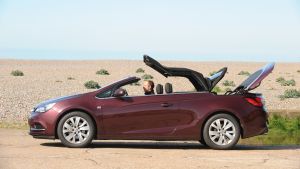
image
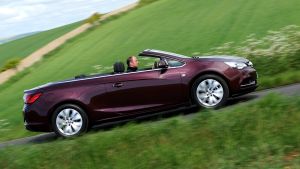
image
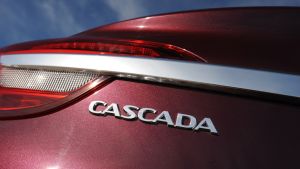
image
The Audi A5 is the pick of the four-seat cabriolet bunch with its premium cabin and strong image, but prices are high compared with the Vauxhall. The Mercedes C-Class and E-Class Cabriolets are worth a look because, like the Audi, they came with some excellent engines, are very plush and desirable.
What to look for
Availability
About two thirds of the Cascadas for sale are Elite editions, the other third being entry-level SE specification.
Headlamps
The standard headlights aren’t all that good, so it’s worth finding a car with the £790 bi-xenon upgrade fitted to it.
Hood damage
Canvas roof goes up or down in 17 seconds at speeds of up to 30mph. Check there’s no fabric damage when examining used examples.
Rattles
The most common gripe appearing in Cascada owners’ forums relates to rattles from the cabin, which they say are more noticeable with the roof up.
Interior
The cabin found on the higher-spec Cascada Elite feels significantly posher than the one you get with the entry-level SE model. This is thanks to the use of leather trim, but whatever you buy you’ll get a usable four-seat convertible, although rear-seat headroom is quite tight with the roof up.

image

image

image

image

image

image

image

image

image

image

image

image
Boot space stands at 380 litres, and thanks to the use of a soft-top rather than a folding hard-top, the capacity with the seats down is still 280 litres. Electrically folding back-seat rests improve practicality further, so longer loads can be stowed when necessary. If you can get over the rather bland design, there is quite a lot going for this interior.
Running costs
All Cascadas need to be serviced every 12 months or 20,000 miles, with three levels of service available. The Interim is an oil and filter change, plus a check of fluids and tyre pressures, priced at £160 for petrol cars and £170 for diesels. The Main check-up costs £265 or £295 (petrol/diesel) and adds a fresh key fob battery, new brake fluid and a replacement drive belt.
Major service costs from £305/£335 and includes new air and fuel filters, plus fresh spark plugs for petrol cars. The schedule runs: Interim, Main, Interim, Major. On top of this, all Cascada engines are fitted with a cambelt that needs to be replaced every five years or 100,000 miles. Official Vauxhall dealers charge £499 to do the work, or £399 if officially approved pattern parts are used.
Recalls
Vauxhall has issued one recall for the Cascada so far. It came in February 2019, and affected 42,603 cars built between May 2009 and January 2014. As those dates suggest, the recall didn’t only affect the Cascada; also caught up in the campaign were other Vauxhall models, including examples of the Astra and Zafira.
The problem that prompted the recall centred on the hill-start assist function, the software for which was found to be faulty. Putting this right involved reprogramming the electronic brake control module, which was done free of charge via approved Vauxhall dealers.
As no replacement parts were required in order to do this, the job was not only a quick one but was also very easy for Vauxhall’s technicians to perform, meaning owners could be on their way again with little delay.
Driver Power owner satisfaction
The Cascada hasn’t appeared in any Driver Power polls, but Vauxhall came a disappointing 29th out of 30 in the 2019 and 2020 surveys of brands. Cascada owners who have left reviews on CarBuyer.co.uk are generally more enamoured, giving an average score of 3.8 stars out of five. Several reviews on CarBuyer refer to problematic Bluetooth connectivity, so check your smartphone pairs okay.
Continue reading...
Vauxhall was being ambitious launching a full-sized four-seater convertible pitched squarely against more premium models. While those rivals were significantly more costly, style-conscious buyers were always going to be put off by the Vauxhall badge.
That’s a shame, because there’s a lot to like about the Cascada, which is comfortable and relaxing to drive (although enthusiasts will be disappointed), plus there’s room for the whole family. Scuttle shake is barely noticeable and refinement is good, but even in range-topping Elite form the quality of the cabin is a little disappointing, while the 1.4-litre petrol engine could do with a bit more grunt. But when you look at what you get for your money, it’s easy to make a case for the Vauxhall, which, as always with the brand, plays the value card very heavily.
Models covered: Vauxhall Cascada Mk1 (2013-2018) - Vauxhall's four-seater convertible is a rare sight on British roads, despite having many alluring qualities.
History
The Cascada reached Vauxhall showrooms in April 2013, priced from £23,995 for the entry-level turbocharged 1.4 SE. There were two trim levels (SE and Elite), and alongside the manual-only 1.4-litre turbo engine was a 1.6-litre turbo-petrol (dubbed SIDI), which came only with an automatic transmission.
At first there was just one diesel engine: a 2.0 CDTi unit rated at 168bhp that was offered with manual or automatic gearboxes. A twin-turbo 197bhp 2.0 CDTi engine was added to the range soon after the Cascada’s launch. While the other engines could be had with either trim, this came only in Elite form.
Another new engine joined the line-up in January 2014: a 197bhp version of the turbocharged 1.6-litre petrol engine, which was only available with a manual gearbox.
Which one?
We wouldn’t steer you away from any Cascada derivative, but the automatic transmission isn’t all that slick, so our preference is for a manual. The 1.6-litre petrol unit is noticeably perkier than the 1.4-litre alternative, which can struggle if the car is loaded up, although the smaller engine is much more common.
The SE is well equipped with 18-inch alloys, rear parking sensors, sports front seats, air-conditioning, cruise control, DAB radio and remote roof operation. The Elite adds dual-zone climate control, perforated leather trim, a heated flat-bottomed steering wheel, automatic lights and wipers, electric seatbelt presenters, plus electric adjustment and heating for the front seats.
Alternatives
To a point the Cascada is in a class of its own, because while there are other four-seat convertibles, they’re invariably more expensive or less spacious. For example, the Audi A3 and Volkswagen Golf cabriolets are stylish, very well made and come with some excellent engines, but they don’t offer the Cascada’s cabin space. The BMW 3 Series (later 4 Series) comes with some superb engines, a well made cabin, and it’s great to drive, but you’ll pay a lot more than you would for an equivalent Cascada.

image

image

image

image

image

image

image

image

image

image

image

image
The Audi A5 is the pick of the four-seat cabriolet bunch with its premium cabin and strong image, but prices are high compared with the Vauxhall. The Mercedes C-Class and E-Class Cabriolets are worth a look because, like the Audi, they came with some excellent engines, are very plush and desirable.
What to look for
Availability
About two thirds of the Cascadas for sale are Elite editions, the other third being entry-level SE specification.
Headlamps
The standard headlights aren’t all that good, so it’s worth finding a car with the £790 bi-xenon upgrade fitted to it.
Hood damage
Canvas roof goes up or down in 17 seconds at speeds of up to 30mph. Check there’s no fabric damage when examining used examples.
Rattles
The most common gripe appearing in Cascada owners’ forums relates to rattles from the cabin, which they say are more noticeable with the roof up.
Interior
The cabin found on the higher-spec Cascada Elite feels significantly posher than the one you get with the entry-level SE model. This is thanks to the use of leather trim, but whatever you buy you’ll get a usable four-seat convertible, although rear-seat headroom is quite tight with the roof up.

image

image

image

image

image

image

image

image

image

image

image

image
Boot space stands at 380 litres, and thanks to the use of a soft-top rather than a folding hard-top, the capacity with the seats down is still 280 litres. Electrically folding back-seat rests improve practicality further, so longer loads can be stowed when necessary. If you can get over the rather bland design, there is quite a lot going for this interior.
Running costs
All Cascadas need to be serviced every 12 months or 20,000 miles, with three levels of service available. The Interim is an oil and filter change, plus a check of fluids and tyre pressures, priced at £160 for petrol cars and £170 for diesels. The Main check-up costs £265 or £295 (petrol/diesel) and adds a fresh key fob battery, new brake fluid and a replacement drive belt.
Major service costs from £305/£335 and includes new air and fuel filters, plus fresh spark plugs for petrol cars. The schedule runs: Interim, Main, Interim, Major. On top of this, all Cascada engines are fitted with a cambelt that needs to be replaced every five years or 100,000 miles. Official Vauxhall dealers charge £499 to do the work, or £399 if officially approved pattern parts are used.
Recalls
Vauxhall has issued one recall for the Cascada so far. It came in February 2019, and affected 42,603 cars built between May 2009 and January 2014. As those dates suggest, the recall didn’t only affect the Cascada; also caught up in the campaign were other Vauxhall models, including examples of the Astra and Zafira.
The problem that prompted the recall centred on the hill-start assist function, the software for which was found to be faulty. Putting this right involved reprogramming the electronic brake control module, which was done free of charge via approved Vauxhall dealers.
As no replacement parts were required in order to do this, the job was not only a quick one but was also very easy for Vauxhall’s technicians to perform, meaning owners could be on their way again with little delay.
Driver Power owner satisfaction
The Cascada hasn’t appeared in any Driver Power polls, but Vauxhall came a disappointing 29th out of 30 in the 2019 and 2020 surveys of brands. Cascada owners who have left reviews on CarBuyer.co.uk are generally more enamoured, giving an average score of 3.8 stars out of five. Several reviews on CarBuyer refer to problematic Bluetooth connectivity, so check your smartphone pairs okay.
Continue reading...
